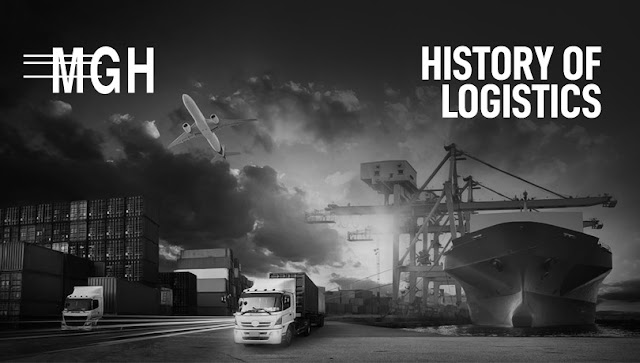History of Logistics
Logistics as we know today, is amongst the more progressing and integral part of business. While the industry is amongst the fastest growing industry contributing a massive 13% to global GDP, our team at MGH Logistics dives deep into understanding and decoding if the industry has always been an important influencing factor of shaping the modern world and what were the major events in history leading to the logistics industry's current state.
The history of logistics to be put correctly is almost as old as the times when Humans realized that mobility was a great advantage for survival. Post which, as you might guess logistics got developed further by the empires and later on various major global events all over the globe.
The logistics as we know today, has evolved a lot over the centuries, been shaped by the needs and necessities of humans.
Roman Empire
The earliest use logistics in history in an organized form, dates back to the histories of 3 major civilizations – Egyptian, Greek and Roman. More so, it was Roman Empire which laid the foundation for 3 of the most basic yet essential elements of logistics – Strategizing, Planning and Execution of complicated military, business or other activities to oversee how resources are acquired, stored and transported to their final destination.
With the empire spread across the continents of Europe, North Africa and Middle East, and the military’s quest for conquering more and more regions, the empire had to lay down strong infrastructural foundation to provide mobility to the multiple legions. The legion’s abilities to march fast and fast owed a lot the high-quality roads and the supply systems, including mobile repair shops and service corps with engineers, artifices, armourers and various other craftsmen. The empire also established various depots, allowing for stocking up labor, animal and resources as pre requirement.
Many experts believe, the term Logistics is derived from the word ‘Logistikas’ a military term used during Roman Empire for officers assigned duty related to supply and distribution of resources to Rome’s legions. The success of the Roman Empire allowed to set in place a logistical method and structure on which a greatly influenced the commerce and the future empires, therefor it rightly has been long called the first stepping stone towards modern day logistics.
Industrial Era
The strong foundations laid by Romans for infrastructure and the methods allowed the rulers to take massive advantage but none were able to particularly reap major returns out of it because inability to execute it in an organized way.
The next major change came towards the mid of 19th century during the industrial revolution, with advent of mass production, colonization and quest of European countries towards conquest of colonies across the globe. The increasing use of rail road, telegraph and steam engine allowed the produce to be easily transported to the port cities and beyond, made the countries benefiting from the Industrial Revolution look for places to sell mass produced goods. Owing to this, the whole of 19th century observed growing logistical prowess of Europe and America. The major force and optimization tough were worked out towards the beginning of First World War, wherein countries were forced to incorporate chains and mobility cycles allowing for the soldiers and weaponry to be transported swiftly.
Another major innovation was the pipeline, allowing to move oil and gasoline near the combat zones. However, the most revolutionary invention came on the back of being able to carry out large scales air transport.
By the beginning of 2nd world war, the warfare capabilities of nations had reached an unprecedented high, requiring countries to move over projectiles in excess of 25,000 tonnes weekly. The warfare allowed for other industries to expand rapidly as well, industries such as steel, garments and many more. The century from mid-19th century to mid-20th century brought most rapid advancements logistics industry had ever seen, with spike in trade, warfare and the ambitious quest of major global powers. It provided the industry major boost and first brought in the need to move huge volumes across the globe.
21st Century
The latter half of 20th century post war saw major efforts towards optimization of logistics in all forms across the globe. The final thrust to the modern-day logistics came with the spread of globalization and opening of various world economies, allowing for the companies to bring into place complex and efficient supply chains for procuring, giving them flexibility of manufacturing with cheap labor and also allowing for selling in markets with higher demands.
The globalization allowed various countries to benefit off from corporates from other nations by allowing them to set-up production and bring in investment to them. The huge inflow of investments and increase in the exports and imports saw emergence of a lot of Logistics companies. One such was MGH Logistics, born out of Bangladesh and Headquartered in Singapore, a logistics company spread across 18 countries with a vision of ‘Working towards logistics of tomorrow’.
The latter half of 20th century post war saw major efforts towards optimization of logistics in all forms across the globe. The final thrust to the modern-day logistics came with the spread of globalization and opening of various world economies, allowing for the companies to bring into place complex and efficient supply chains for procuring, giving them flexibility of manufacturing with cheap labor and also allowing for selling in markets with higher demands.
The globalization allowed various countries to benefit off from corporates from other nations by allowing them to set-up production and bring in investment to them. The huge inflow of investments and increase in the exports and imports saw emergence of a lot of Logistics companies. One such was MGH Logistics, born out of Bangladesh and Headquartered in Singapore, a logistics company spread across 18 countries with a vision of ‘Working towards logistics of tomorrow’.




Comments
Post a Comment